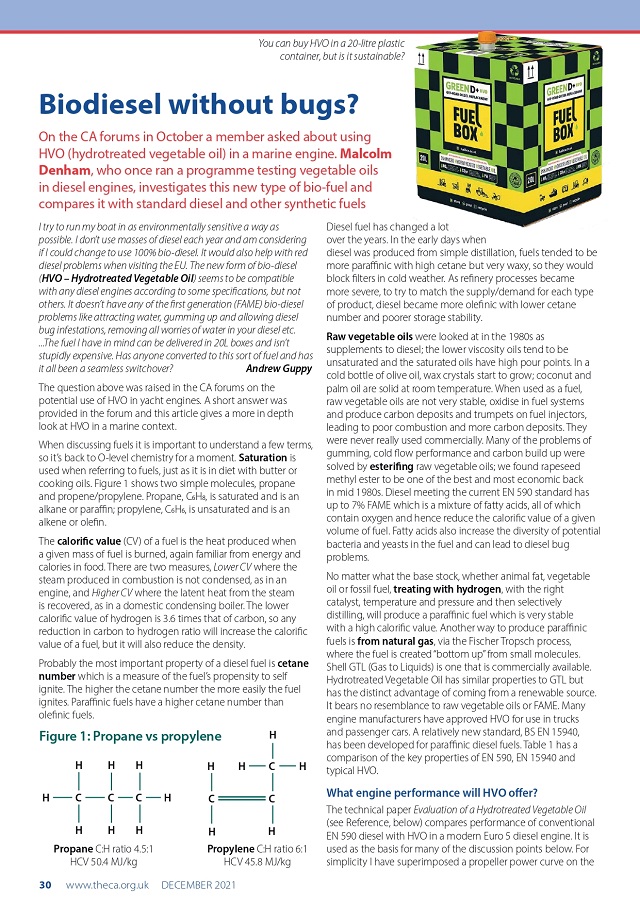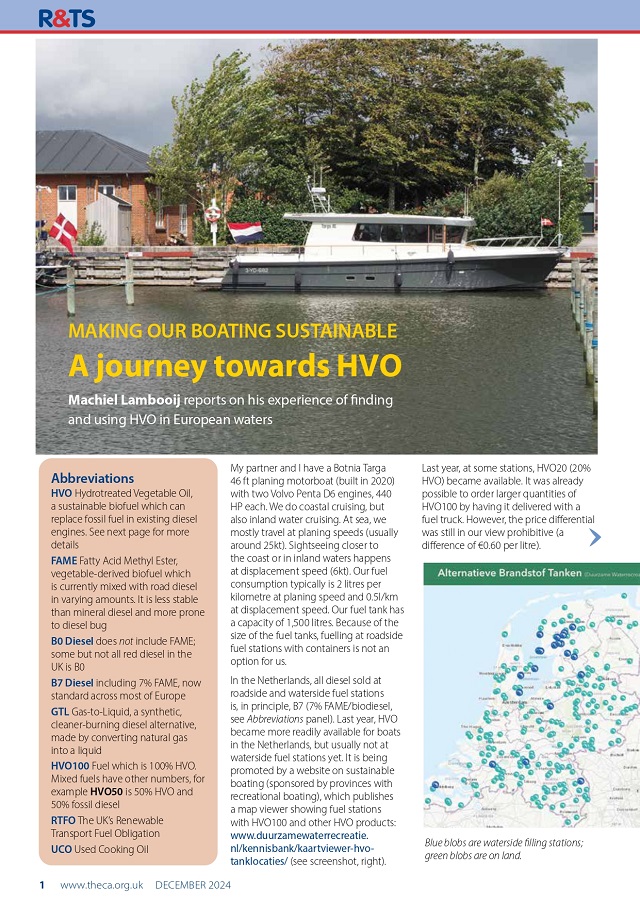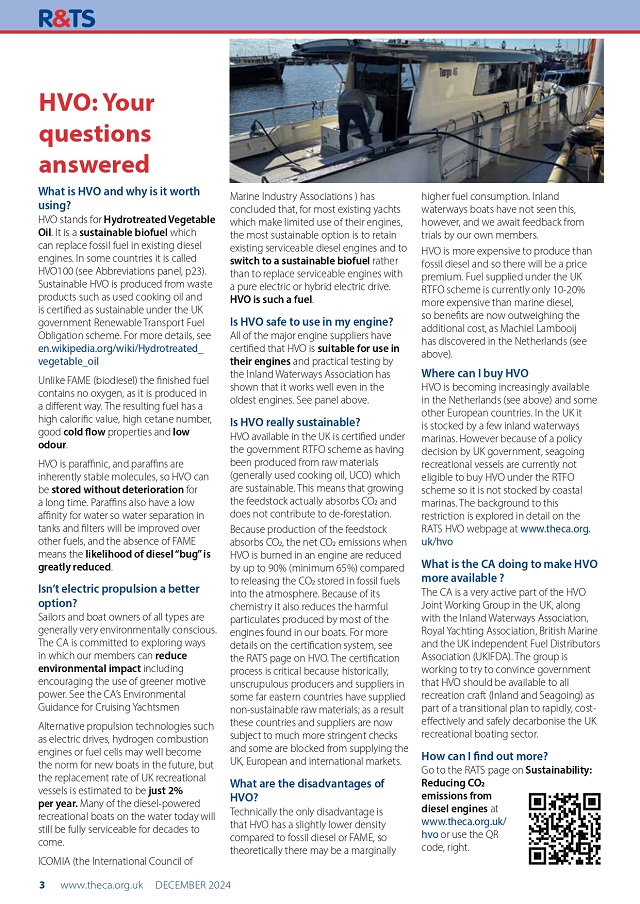Let’s Talk About HVO


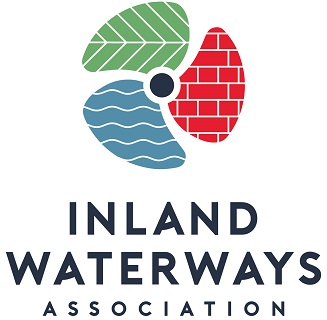

Hydrotreated Vegetable Oil: A sustainable marine fuel for your boat’s diesel engine
#GreenerBoatingDiesel
If you care about the marine environment, you will be considering how to minimise your carbon footprint when out on the water.
Like most cruising sailors, you probably power your current boat with a diesel engine and you may not be ready yet to transition to electric drive.
However, you can dramatically reduce your boat’s CO2 emissions without modifying your current diesel engine.
In line with our commitment to the sustainability of boating, the Cruising Association (CA) is working with the Royal Yachting Association (RYA), British Marine (BM) and the Inland Waterways Association (IWA) to raise awareness about the environmental and safety benefits of switching recreational vessels from fossil diesel to HVO (Hydrotreated Vegetable Oil) - a cleaner, greener, sustainable fuel.
How can cruising sailors make the switch?
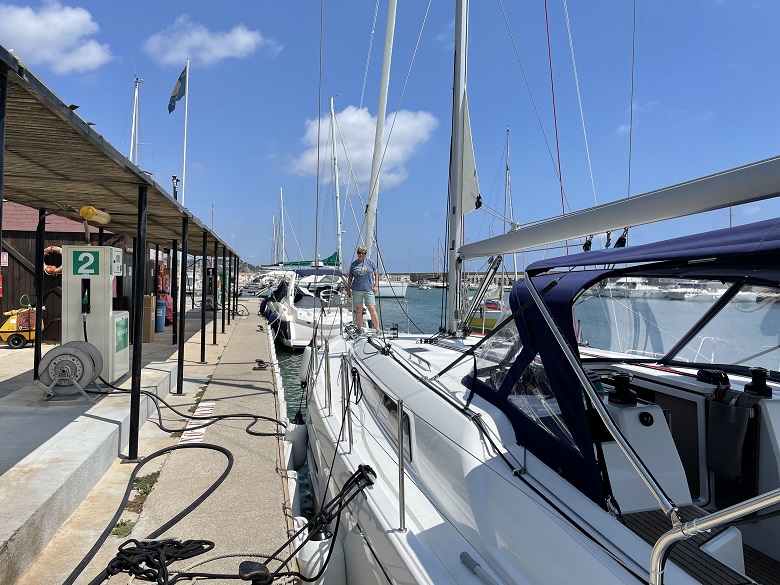
HVO can be used immediately in your boat’s current engine to significantly reduce carbon emissions.
Renewable HVO fuel is:
- Tried and tested - proven in a range of boats and engines
- Manufacturer Approved - by the leading marine diesel engine manufacturers* (see link to: www.theca.org.uk/hvo-approved-engines)
- Drop-in Ready - safe to use as a drop-in replacement for mineral diesel with no engine modifications required
*Check your model with your engine manufacturer before switching.
So, what’s holding us back?
There are two key barriers to the widespread adoption of HVO (for both propulsion and domestic use) in the leisure boating sector:
- Limited Availability - HVO is not widely stocked for recreational vessels
- Unstable Price - costs and incentives have been very variable
In the UK, one contributing factor is that seagoing recreational vessels are not incentivised to use HVO as they are not eligible to use HVO under the UK Government’s Renewable Transport Fuel Obligation which supports its use in other transport sectors.
The CA, RYA, BM and IWA have formed a HVO Joint Working Group (HVOJWG). Together we want to change UK Government policy and increase the adoption of HVO in existing diesel engines across the whole UK recreational boating sector.
Take action: support our campaign for #GreenerBoatingDiesel
The Cruising Association invites all owners of seagoing vessels to Take Action for #GreenerBoatingDiesel
We need your support as a cruising sailor to help increase demand, expand supply and stabilise the price of HVO in order to encourage the adoption of low carbon fuel in the leisure boating community. Please:
- Use HVO - whenever it is available
- Tell your marina or fuel supplier – that you would buy HVO if it was available
- Contact your MP - lobby or write to your MP asking them to pressurise the UK Government to support our campaign to remove the legislative barriers in the RTFO scheme to make HVO available and affordable for recreational seagoing vessels.
- Call for Evidence - The UK Government ‘Call for Evidence’ closed on 27 January 2025. The Cruising Association has actively submitted evidence as part of this campaign and would like to thank all who participated in the ‘Call for Evidence’ and shared their views.
What's Next
The CA will share further updates on the #GreenerBoatingDiesel campaign as they become available. Our goal remains to:
- Encourage greater availability and affordability of HVO, and
- Advocate for the inclusion of seagoing recreational vessels under 24m within the RTFO scheme.
Stay tuned for updates and future opportunities to support this important initiative. Together, we can make #GreenerBoatingDiesel a reality for the leisure boating community.
The technical bits: what is HVO?
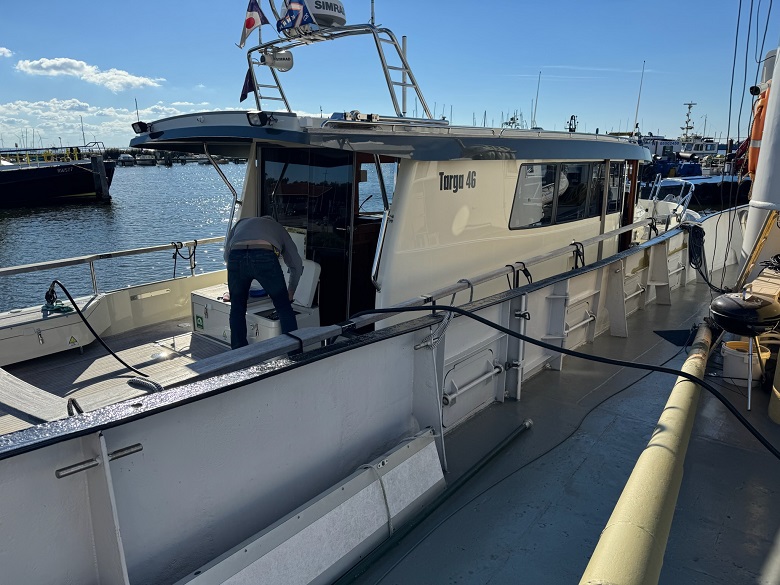
Hydrotreated Vegetable Oil (HVO) is a new generation renewable fuel produced from bio feedstocks, often waste oils, and stabilised using hydrogen. Certified by the UK Government as sustainable, it is acknowledged to reduce carbon emissions by up to 90%. In addition, HVO does not suffer from the drawbacks of first-generation biodiesel (known as FAME), such as diesel bug, and is stable for long periods of time in a marine environment.
HVO is:
- Clear, colourless and odourless
- Cleaner than mineral diesel, with lower particulate emissions
- Suitable for use in any concentration with mineral diesel, from 1% to 100%
- Suitable for supply and distribution using existing marine infrastructure
United for greener boating: about the Joint Working Group
The mission of the HVO Joint Working Group (CA, RYA, BM, IWA) is to persuade the UK Government to adopt policies that will make HVO affordable and available to leisure boaters. We are also raising awareness among boaters about the environmental, safety and compatibility aspects of HVO with the view that an increase in demand will stimulate the supply network in the leisure boating sector.
Backed up by practical evidence and international research, plus tests and surveys of the use of engines carried out on behalf of members of the HVO Joint Working Group, we conclude that sustainable HVO is a simple, cost effective and immediate pathway to greener boating. We believe it can enable more UK owners of existing inland and seagoing recreational boats to immediately contribute towards Net Zero while novel propulsion technologies are developed for new boats.
The challenge: improving the availability and price of HVO
The price of HVO has been variable and, at times this has been a barrier for some leisure boaters. The price and variability are partly due to the cost of production but also to the nature of the markets for both the product and the secondary market in incentive certificates. This means distributors and retailers have been reluctant to market it to the boating community in the UK and boaters are hesitant to buy it.
Our surveys suggest that many boaters would be prepared to pay a small premium to reduce their environmental footprint, and to reduce risk of problems associated with FAME but there is still work to do to increase availability and stabilise the price of HVO for recreational vessels.
For inland boaters, our HVO Joint Working Group is collaborating with suppliers to help boaters understand the benefits of adopting HVO in place of mineral diesel. HVO is becoming available for inland waterways vessels in the UK, through the IWA’s list of current UK stockists and other suppliers.
For seagoing vessels, availability is improving in some countries, but it is not yet available in the UK. Our campaign aims to change the rules to enable seagoing recreational vessels in the UK to have the same access to HVO under the RTFO scheme as inland vessels.
To achieve this, we are asking the UK Government for:
- Eligibility for seagoing recreational vessels under 24m as part of the RTFO (Renewable Transport Fuel Obligation) scheme.
A change to the rules would lower the price for more boaters and reduce administrative complexities to encourage fuel retailers to sell HVO to seagoing recreational vessels under 24m. The CA has our case in a submission to the UK Government’s Department for Transport (DfT) call for evidence on the current RTFO, which closed on 27 January 2025. - The inclusion of seagoing recreational vessels under 24m as part of a single overall UK recreational fleet.
We aim to convince the UK Government’s Climate Change Committee (CCC) to consider seagoing recreational vessels in a separate category to big ships, when formulating decarbonisation policy. This would ensure practical and relevant advice is offered to UK leisure boaters about the transition to renewable fuels. - Request the government looks at the operation of the RTFO to minimise fluctuations in price that may be exacerbated by RTFO mechanisms.
Join with us to help ensure all recreational boating in the UK is more sustainable
#GreenerBoatingDiesel

Update
10 April 2025 – Read the joint statement by the Royal Yachting Association, British Marine, the Inland Waterways Association and the Cruising Association in response to the recent (9 April 2025) BBC investigation.
14 April 2025 – Read the latest update on the CA stance on the stringent sustainability auditing of HVO fuel.
Further information
For several years, the Cruising Association has been researching and gathering information, which has been published in our quarterly magazine Cruising - click/tap on the graphic to read:

